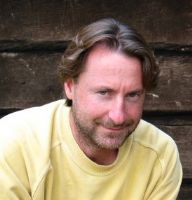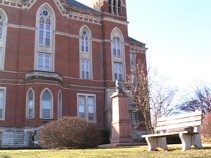Prof. Kevin Howley Analyzes Community Media in Bloomington Alternative
May 2, 2005
 May 2, 2005, Greencastle, Ind. - "At a time when our media environment is dominated by a handful of multi-national corporations divorced from the geographic communities they proclaim to serve, indifferent, and often hostile to, the public interest, and principally motivated by capital accumulation, community-oriented media vividly demonstrate that media matters." That's the view of Kevin Howley, assistant professor of communication and theatre at DePauw University. In the new Bloomington Alternative, and continuing through the publication's next few issues, Howley explores Bloomington, Indiana's community media outlets.
May 2, 2005, Greencastle, Ind. - "At a time when our media environment is dominated by a handful of multi-national corporations divorced from the geographic communities they proclaim to serve, indifferent, and often hostile to, the public interest, and principally motivated by capital accumulation, community-oriented media vividly demonstrate that media matters." That's the view of Kevin Howley, assistant professor of communication and theatre at DePauw University. In the new Bloomington Alternative, and continuing through the publication's next few issues, Howley explores Bloomington, Indiana's community media outlets.
The professor, whose new book, Community Media, was just published by Cambridge University Press, argues "community media put people before profits. Rather than cultivate cultural homogenization, community media celebrates and encourages innovative cultural expression. Likewise, community media provide local populations a unique opportunity to 'make the news' so that journalism serves the public interest, not the vested interests of the political class and business elites. The Alternative is but one example of this impulse—to make local media outlets that are at once responsible and responsive to the communities they serve and represent." 
Dr. Howley notes, "Often doing more with less, community media remind us that a democratic society functions best when the channels of communication are open and accessible to a range of voices, opinions, and perspectives. Rather than surrender to the pessimism that inspires defeatist mottos like 'Kill Your Television,' our communities are better served by heeding Jello Biafra’s sage and pitchy advice to 'Become the Media.' From an academic perspective, then, independent, community-oriented media represent a distinctive, if somewhat overlooked dimension of contemporary media culture."
Access the essay, and check for the professor's follow-up columns, by clicking here.
